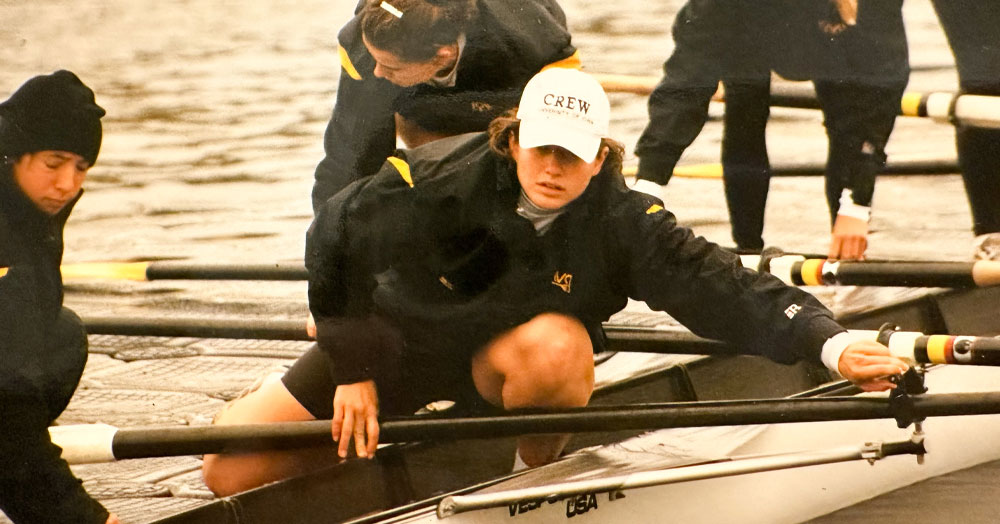Iowa Athletics Hall of Fame
Anne West Burmeister (98BS, 04JD)
Anne West Burmeister remembers the silence.
She remembers the quiet when rowing practice at Iowa would begin every morning before the sun came up.
“You’re launching the boat in the dark, when the (Iowa River) was completely still,” she says. “You could only see the bow lights on the boat, and you push off and it’s quiet. There’s a reverence to the moment. Everyone wants to be quiet, and all you hear is the blade in the water.
“By the end, coming back, with the energy and the intensity of the 2½-hour practice, and the campus has awakened and the boat riggers are loud, you’re breathing hard—there’s the whole feeling of starting out with peace and ending with all of that energy. It’s one of my favorite memories.”
Burmeister is the first rowing athlete to be inducted into the Iowa Athletics Hall of Fame, a career that has a fascinating beginning.
Burmeister grew up in Waverly, Iowa and decided to attend the University of Iowa—“I lived in a house full of (Iowa State) Cyclones, so going to Iowa City was a bit of a divergence,” Burmeister says, laughing—after visiting the campus and liking the university’s liberal arts opportunities.
One day, Burmeister saw the rowing team practicing on the river.
“I had never rowed before,” she says. “I saw them rowing, and I called the coach and asked if I could try out.”
The resumé she built with such little experience was impressive. Burmeister was a 1997 All-American, the first in the program’s history. She was a member of the fours team that placed fourth in the 1997 NCAA championships, and she was a top-10 finalist for the 1998 NCAA Woman of the Year. Burmeister was also a Big Ten Medal of Honor recipient in 1998 and 1999.

PHOTO: HAWKEYESPORTS.COM
Being the first rower in the Hall of Fame adds to that resumé.
“It’s an honor to represent my teammates I rowed with, but also the women of the (rowing) club that were the basis for the varsity team that began, and all they taught us, and everybody who has come since,” she says. “There are a lot of amazing rowers to represent.”
Burmeister, now the director of institutional equity compliance and support at Sacred Heart University in Fairfield, Connecticut, has never strayed far from a college campus.
Of her time at Iowa, Burmeister says, “It was one of the single most influential experiences for the person I am today, for sure. It taught me to tackle something bigger than I thought I could tackle. It brought me some of the best friends I’ll ever have. It provided a structure and an energy to my college experience that enhanced my academic career. In a way, it mostly taught me how to break down really big tasks that seemed insurmountable.”
—JOHN BOHNENKAMP
